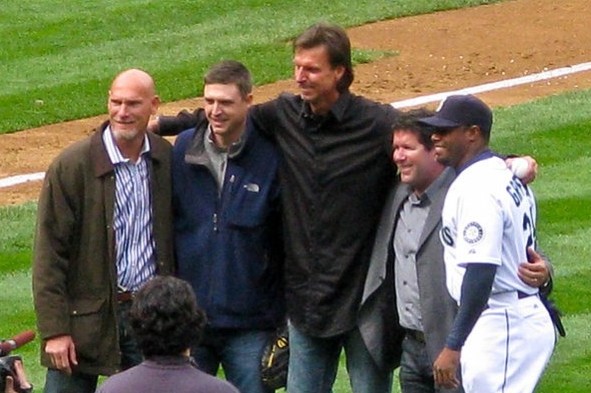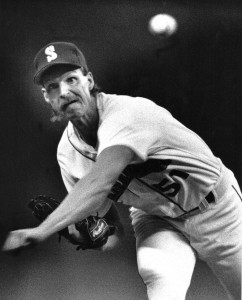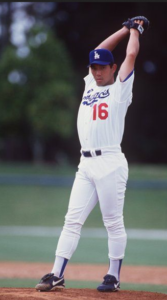
Since the Mariners are celebrating 40 years of mostly major league baseball in Seattle, we would be remiss in not joining them with a review of what happened 20 years ago, because it represented the greatest squandering for a team that traditionally squanders with the best (worst?). Are we in the historical spirit, or what?
The Seattle Times did a fine job last week of ranking the 40 best players in club history. Columnist Larry Stone followed up by pointing out the the Mariners’ glory years from 1995 to 2001 featured Hall of Fame-caliber talent that helped create the franchise’s only (four) playoff teams, yet never made the World Series.
Piniella has often called the failure to reach the Series with Ken Griffey Jr., Alex Rodriguez, Edgar Martinez and Jay Buhner in their primes the single biggest regret of his managerial career.
The premier opportunity came, as Stone pointed out, in 1997, when the Mariners played in the audio riot of the Kingdome, which hosted 3.2 million fans that season. Not only did Seattle hit 264 home runs (still a major league record), but a healthy Randy Johnson was 20-4 with 291 strikeouts and had two good rotation colleagues in Jeff Fassero (16-5, 3.61) and Jamie Moyer (17-5, 3.86).
Yes, the 2001 team won 116 games, but after 9/11 left the nation and world so stricken, sports outcomes were rendered random and nearly moot.
What thwarted 1997 — the first year the Mariners (90-72) won at least 90 games — was the incredible collapsing bullpen. Norm Charlton, a hero in 1995, was done by 1997, bloating to a 3-8 record and 7.27 ERA with 14 saves. The alternative, demon spawn Bobby Ayala, was actually better (10-5, 3.82) with eight saves, and much-lamented Heathcliff Slocumb had a 4.13 ERA with 10 saves.
Despite the rotation and the thumpers (Joey Cora had 11 homers!) the ‘pen could not be overcome. The Mariners lost 3-1 in the first round of the playoffs to a 98-win Baltimore team. Orioles ace Mike Mussina twice beat Johnson, which in hindsight was the beginning of The Big Unit’s end in Seattle.

In 1998, distracted by the absence of a long-term deal, jealous of Griffey and A-Rod, and wanting to pitch for a serious contender, Johnson pouted his way into a mid-season trade to Houston. According to Buhner, fury with the ‘pen played a role.
For my 2002 book, Out of Left Field, which chronicled how the Mariners parlayed six good weeks in 1995 into saving baseball for Seattle with $380 million in public funds for a new stadium, Buhner recalled the petulance of Johnson.
“Several times, Lou would go out to relieve Randy, and Randy would say something like, ‘F— you, I’m not giving you the ball. If we’re going to be losing this game, I’m going to lose it. I’m tired of coming out of games and not getting (a win or a loss).’ The bullpen problems were big in Randy’s mind, without a doubt.”
The story gets more intriguing. By early 1998, Johnson was abruptly mediocre, the team was dismayed on its way to a 76-win season, and the patience-challenged Piniella wanted him gone. Teams smelled blood and sent scouts by the dozen to Mariners games hoping to strike a deal for a once-in-a-generation pitcher.
In late May, a TV news report said the Los Angeles Dodgers were about to acquire Johnson in exchange for starting pitchers Ismael Valdes and Hideo Nomo and either outfielder Todd Hollandsworth or Wilton Guerrero.
The rest from the book:
Sources on both teams later confirmed the primary elements of the trade. But the deal quickly and mysteriously dissolved. On a flight back from a series in Baltimore, Lee Pelekoudas, the assistant GM who had no affection for Johnson, had trainer Rick Griffin summon Johnson to the front of the plane. Johnson sat down next to Pelekoudas and said, ‘My wife called and said she saw on TV that I’ve been traded to LA. When do I go?’
“The trade didn’t happen,” Pelekoudas said. “Our intent is to keep you.”
Stunned, Johnson stood up, returned to his seat, and spoke to no one for the rest of the flight. The Mariners were stunned too, and Piniella was angry. Although it was never explained publicly, the deal was killed by Hiroshi Yamauchi, the reclusive Japanese owner who supposedly had little interest in the club’s daily affairs, and had never seen them play in person.
It was not that Yamauchi had great affection for Johnson. The owner’s interest was in his countryman, Nomo.
He didn’t want him.
When Nomo made himself available to U.S. teams after the 1994 season in Japan, Yamauchi alerted Howard Lincoln, the Nintendo of America vice president and his representative on the Mariners board of directors, that he was eager to have Nomo join the Mariners. But Lincoln assumed his boss was expressing interest, not ordering a signing. The consequences of the misunderstanding would linger for years.
Lincoln may not have wanted to hear a request to hire Nomo. The Mariners were unhappy with their first experiment in Japanese baseball talent. Makato (Mac) Suzuki, a young pitcher who never played professionally in Japan, was proving a bust in the U.S. (signed for $800,000 out of high school, he eventually washed out with the Mariners by 1999).
As Nomo prepared for U.S. teams to bid for him, he held a workout that Piniella attended. Watching his funky delivery motion, Piniella dismissed Nomo’s chances: “No, no, we don’t need that — he can’t pitch over here.”
The Dodgers thought otherwise, and signed Nomo. He became the 1995 National League rookie of the year, and finished fourth in the voting For the Cy Young Award. He did so again in 1996, when he accomplished what was believed impossible — a no-hitter at high-elevation Coors Field, where breaking balls and ERAs go to die.

Nomo and Valdez, who had a solid 12-year MLB career with an ERA below 4.00 in each of his first six years, would have been a quality tandem in Seattle. But why didn’t the 1998 deal for Nomo go through?
Back to the book:
Yamauchi, showing the stubborn, eccentric character for which he was notorious in his homeland, woke up Lincoln in the middle of the night in an Atlanta hotel room. The Johnson-Nomo trade rumor was all over TV in Japan.
“I thought I told you you can run this damn club,” Yamauchi said through his interpreter. “But when it comes to Japanese players, you check with me first.”
“In terms of Nomo,” Lincoln said of Yamauchi’s policy, “the Mariners had their opportunity (in 1995), lost it, and so would never be reconsidered.”
While it’s true that the Mariners subsequently did get for Johnson three solid players from the Houston Astros — pitchers Freddy Garcia and John Halama and shortstop Carlos Guillen — all of whom contributed to the 2001 team of 116 wins, hindsight says Nomo would have been a fine free agent hire in 1995 at 26 and a solid acquisition in 1998. But it didn’t happen in ways unique to the Mariners.
Johnson was 10-1 and helped the Astros in the playoffs, where he again lost both his starts. But he became a free agent, and the Arizona Diamondbacks won the bidding war. In their second year of 1999, the D-backs won 100 games. In the fourth season of 2001, Arizona beat the Yankees 4-3 in the World Series, where Johnson and Schilling were co-MVPs.
Regarding the Series, the Mariners, you may have read, are still 40-year-old virgins.
It’s true that Nomo was not the reliever desperately needed in ’97, but he was a quality starter that would have kept innings away from the pen. Whether Nomo would have made a vital difference, the Mariners could not stop two impulsive guys, Piniella and Yamauchi, who are unskilled in the art, from getting involved in personnel decisions.
Of such steps upon upturned rakes are 40-year droughts made. But if Mariners history is of any use to general managers Jerry Dipoto in the remaining days before this year’s trade deadline, let 20 years ago be a lesson:
Keep stoking the bullpen, lest you make a Big Hash out of a Big Unit.

29 Comments
Hey Art, I’ve always wondered about that 98′ season? Great article! We are blessed with great scribes in Seattle but you are at the top of the list! No “Fake News” here!
Good man, Ref63. Pass the good news.
There was an early season meltdown in Boston that year that set the tone for the entire ’98 season. One of THE WORST blown games I’ve ever seen. 2 words: Paul Spoljaric
Superb article. So much fun to read. Keep up the good work! Regarding last night…it came down to ex-Mariner Aoki and he couldn’t get the guy home from third. That was the ballgame. Segura’s play from short was outstanding.
Thanks. Tell your friends.
It was a perfect time for another ex-M to do in Seattle. He didn’t. Omen?
Omens are only as good as the next day’s pitcher. But I’m sticking with my amended prediction of 87 wins and that will likely get them in to a wild card bash if it happens. But will Paxton have anything left in October if he pitches that game? Never been above 125 innings. A little like Jamo’s comment on 2001. No true ace this year. And only a one game playoff this time?
The real second half issue is so many five-inning starts leading to bullpen burnout. We saw it already with Diaz/Vincent each going four days in a row. Keep an eye out for how many starters get past six innings.
At the moment this team isn’t built for a September run.
Great article, Art. But I still have a soft spot for Randy. Can anyone blame him for wanting out? The M’s are the quintessential mediocre team… a few ups and downs, but they always find their way back to the middle. I mean, Go M’s! But I learned a long time ago not to get my hopes up. It’s uncanny. They replace the owner, GM, all the coaches and nearly every player, and they just keep being mediocre.
I think even Randy might admit today that he sometimes was insufferable, but yes, I can’t blame him for wanting to move on.
I also think that the way it has always been is not necessarily the way it will always be. Cubs took 108 years. but they did it.
One memory I have of Randy in that era is that his father died one off-season and when Randy came to Seattle prior to spring training, Chuck Armstrong asked (after his passing) how his father was doing. Randy was offended by the fact many in the club were unaware what had happened.
That was always a sore point. Chuck and Randy crossed paths in the Seattle offices, and Chuck simply hadn’t heard. A shame for both of them.
I surely defer to your knowledge of Randy’s temperament back in those days, and I agree that there are lots of reasons to expect the M’s to get better. But I’ve thought that every spring for many years. Sure, I still love the M’s and enjoy the art of the game, but lost my competitive spirit about it.
It is indeed possible for fans to get broken. Especially when nearly every other team figures it out at least once in awhile.
Good ol’ Howie: Private sector success, baseball nimrod.
The same scenario is widespread throughout pro sports.
Not sure what’s worse… Having no team (thanks Wally Walker and Howard Schultz) or having to suffer through the leadership of the Howard Lincolns/Elgin Baylors/Matt Millens of the world. Its extra brutal when its so clear to everyone except the perpetrator. And before you say it, I know Lincoln wasn’t a GM, but he hired some of the worst GMs ever and his meddling in personnel moves was well-known.
Antidote: Admire the fact that Paul Allen and the Seahawks got it right, and so have the Sounders.
As a Seattle-lifer, I admire the hell out of the way Paul Allen has done it. The Sounders are a non-starter for me, but I’m happy for soccer fans of the area. I’m optimistic about the new M’s regime as well. The criteria for being a Mariner seems to now be Major League readiness, which is a nice change from the previous criteria of having a cute nickname.
Great revisit of the era Art! Thank you. I am not sure where my copy of your book is as I have shared it with family and friends who might not otherwise have read it. But the subtitle has always made me think of it as a “period piece”. LOL
I agree that the 1997 team was probably the best shot the Ms have had. The 2001 team had no true #1 starter. It had some 2s and 3s, and perhaps its 4th and 5th starter were better than the opposition’s.
Opportunity squandered. Hard to imagine at the time where the Ms were headed after that, but when a team is so close, management has to have the guts to try and put it over the top.
.
The new stadium had been through its legal challenges in 96, so income would be flowing by 99, but they somehow failed to fix the pen to bolster what they had.
Seems like only yesterday when you tell this story. I was so bummed by it all in 97, not to mention ’01’, although 9/11 in ’01’ made it understandable. Not so in ’97’.
Now with the current streak going, I’m saying to myself, “you mean we still have a chance?” I’m a die-hard.
All of MLB is counting on fans like you.
The downfall really started after the 1995 season. The club got rid of two integral relievers in Nelson and Risley plus their super sub in Sojo. They never got replaced until 2000. Acquiring Dave Hollins and Terry Mulholland for a playoff run in ’96 was wasted. ( of course the club gave up David Ortiz for Hollins) This pretty much set up the hole the club found itself in for 1997. As much grief as the M’s get ( much deserved ) for the Slocumb trade the Jose Cruz Jr trade was almost as bad.
We could go all night building the “almost as bad” category.
True.
Bobby Ayala got 10 wins by blowing saves.
264 homers can patch many leaks.
Thanks for the necessary painful reminder of ’97, Art. I remember going to the games with my family that year and listening to the M’s starting lineup being announced. We were loaded that year one through nine in the lineup. Not to mention the best and most fearsome lefthander of his generation. How did we not win anything in that era! It still hurts. Who says there’s no crying in baseball?
“…demon spawn Bobby Ayala…”
Thank you for that one.